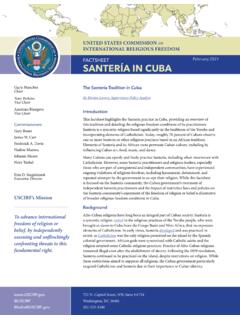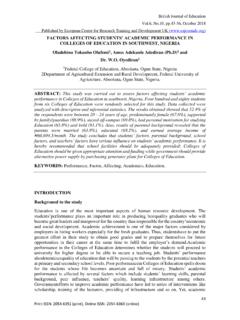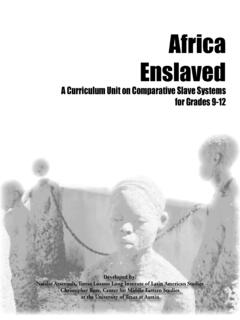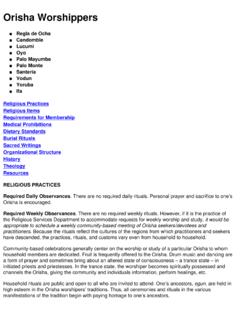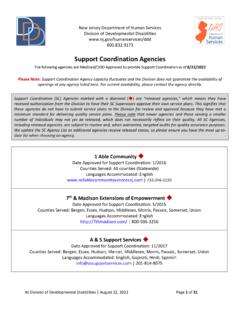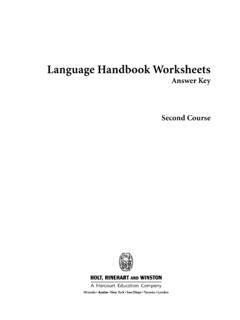Transcription of RITUALS, SYMBOLISM AND SYMBOLS IN YORUBA …
1 AJT/4:l/90 RITUALS, SYMBOLISM AND SYMBOLS IN YORUBA TRADITIONAL RELIGIOUS THOUGHT E . Dada Adelowo* Introduction This paper' is moti~ated by' the need. to ' correct the erroneOUS observatiods, notions, assertions and pontifications of some foreign armchair investigators about . religious situations, facts and values in Africa as a whole. Examples of such ' observ~tions, notions and so on can be multiplied in this regard. Baudin, for example, moved by his pre-conceived notions and possibly moved by cultural pride and prejudice declares: The idea they (Africans) have of God is most unworthy of His Divine majesty. They represent that God, aft~rhaving commenced the organisation of the world, charged Obatala with the completion and government of it, retired and entered into an eternal rest, occupying himself only with His own happiness; too great to interest Himself in the affairs of His world.
2 He remains like a negro king, in a sleep of idleness. 1 This is purely a definite reading in of the Western deistic philosophy into pure African belief.. Another foreign investigator, Diedrich Westermann, wrote on African belief system when he probably had little access to the proper sources of African beliefs and practices or when he had little more than' a chance opportunity of a cursory glimpse of a gagantuancontinent. Thus in connection with the African concept of God, he declares: J The high-god is, as a rule, not the object of a 'religious cult and is of small or almost no significance in practical religion. People acknowledge him but neither fear nor love nor serve It is to be noted that a good number of such scholars had, over the years, taken appearance for reality, symbol for the symbolised, means for the end with regard to the religious situation in Africa.
3 Reasons for this step are not far-fetched. A lot of them were staying behind the garden and at the same time trying to pontificate on the items in the garden. Some had not even touched the African soil. Rather, they relied on the reports of traders and missionaries in dishing out information on the religious situation in Africa. * E. Dada Adelwo is a Professor in the Department of Religious Studies, Ondo State University, Ado-Ekiti, Nigeria. 162 AJT/4:1/90 Thus, ,the need is felt to present the topic -rituals, SYMBOLISM and SYMBOLS which are sure sources of African beliefs and practices -'--as a means to intimate the cursory observers about what, in fact, constitutes the actual religious situations in Africa and in Yorubaland in particular.
4 Rituals and Rites: An Issue of Functionality Rituals and rites are a means of bringing into the limelight the ~eligio~s experience . ofa group of people; Rituals and rites thus constitute some kind of religious expression. They are a means of concretising one's belief system. They are a means of expressing one's experience of the supersensible world and the supernatural beings. In short and simple terms, they are acts of forms of worship or communion and communication between one and one's objects of worship. Before w~ begin an analysis of the types of rituals and rites, let us have a look at t~e following basic items: Ritual Leaders Rituals in YORUBA traditional religion are not usually administered by the uninitiated or the untrained ( YORUBA : ogberi), Rituals are usually administered by the priests known as aworo or iworo.
5 They are specialists in leading the others in worship. They are devotees of orisa; that is, there is something of the divinity in them and it belongs to their position not only that they should offer worship to the orisa, but also that they shollld absorb the orisa into their being and manifest it. Traditionally, specialists in ritual administration followed the craft from father to sOIl; through several or even many generations, handing down their techniques and forms of training, their quintessential experience and habitual shrines where application collld be made to the gods and spiritS.. -It is to be noted that it was an attempt to resolve. the need for an adequate link between the object of worship arid man that the idea of ritual leaders.
6 Emerged in YORUBA religious thought And since man felt that heha,d to deal not wilh a vague abstraction but a Reality with the attributes of person, he naturally t1i~Ught of ~. means which would be a person -a person sufficiently "human" to make intimate contact with man and not harm him. In short, the need for a personal mediator, a priest, a ritual leader, a specialist in ritual administration, . In the cultic activities of a town the Oba is usually the head of the ritual leaders. He is the priest-king. In He-Ife, for example, the Ooni of Ife, Aldse EkejiOrisa is usually the Pointifex Maximus, He is the 016rf Awon [woro -:-the head'ofall the priests. He assumes this office in consequence of his sceptre (are) which is derived from the divinity to whom he is vicegerent.]
7 The office still stands even though. the Ooni does not now officiate directly at any particular shrine and only performs certain customary rituiils as tradition decrees.. Ritual Power . The Ooni of Ife or any head of YORUBA town is mentioned above as the head of all priests. This is in consequence of the ritual power believed to be possessed by the. kings or rulers. YORUBA kings are believed to be derivatively divine '-They are held to be second-in-command to the Divinity -Aldse Ekeji Orisa. That is , Kings in 163 AJT/4:1/90 Yorubaland are divine. But according to Basil Davidson, 'ritual's would be abetter adjective. Kings in Yorubaland are frrst and. foremost repositories of ritual power. Their authority rests mainly and consistently upon its place in their people's beliefs about themselves and the world.
8 YORUBA kings are ritual specialists who have accumulated power in societies which have passed beyond the early subsistence level and had developed whether in isolation or by the stimulus of migrant ---,-resident accommodation, the need as well as the possibility of centralising institutions .. Thus the original nature.' of Y oruba kings is to be sought in ritual specialism associated with the guardianship of ancestral charters. It is to be noted that YORUBA kings, then, were not 'divine' in the sense of being regarded as gods. They are political and therefore earthly people as well as ritual and hence spiritual ones.. Hence the accent on 'divinity'. For the king's existence as a political figure or military leader is a secondary thing.
9 Over and beyond these secular functions, a Y oruba Oba has to maintain harmony and concord between society and its natural environment by means of ritual action of a regular kind which he alone could take. His functions in this realm are three-fold: to perform the daily rites6 for which he is uniquely qualified by office; to provide for and direct the activities of other cults; and to sustain and control his own spiritual potency. These words about the kingship of the Nigerian Jukun have a wide application and are relevant to the picture given above. Block of medieval Western Europe writes: The king .. (had) three fundamental duties and scarcely any other to ensure the spiritual welfare of his people by acts of piety and the protection given by acts of piety and the protection given by the true faith; to defend his people against outside enemies.
10 , and at home, to safeguard justice and peace. ! . Other priests, YORUBA [woro, Aworo, Abore have ritual power in consequence of thepCJwet bestowed on the priest -king, 0l6rf [woro. Thus the ritual power of priests is subsumed in thepo~er of the priest-king, a priest never functions in connection with the central cult and culture without the knowledge and courtesy of the priest-king. Ritual Sanctity This has to do with the various taboo in connection with the administration of the various rituals and rites that constitute YORUBA traditional religion. This can also be called ritual holiness. The taboo are what the Yorubacall eewo, a kU see, ohun. Each ritllal has its taboo that should be avoided by the priest-king, Ol6rf dwon [woro, other priests, [woro or Abore, and the worshippers.]]]]
